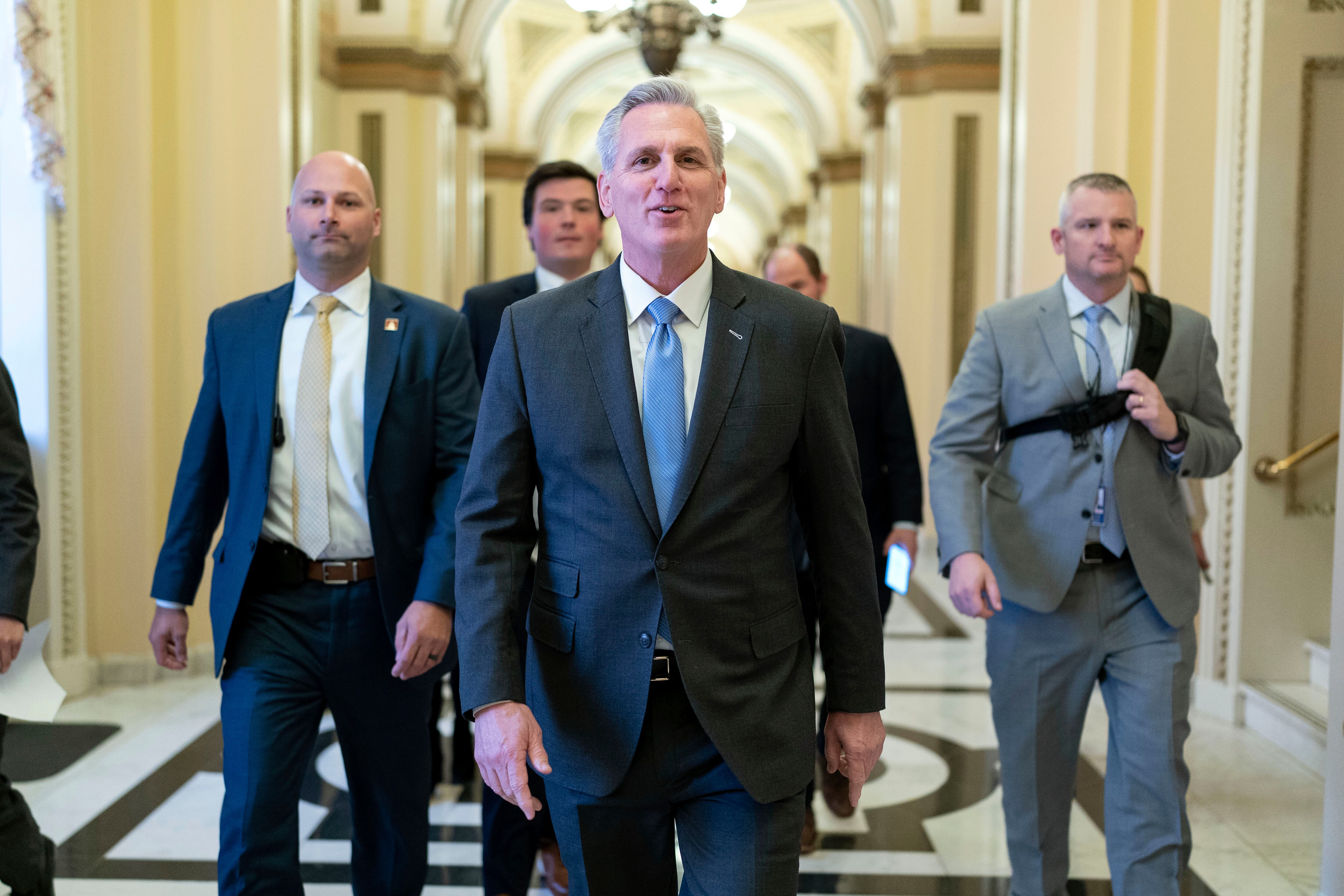By Lisa Mascaro
Electing the House speaker may have been the easy part. Now House Republicans will try to govern.
Speaker Kevin McCarthy passed his first tests late Monday as the Republicans approved their rules package for governing House operations, typically a routine step on Day One that stretched into the second week of the new majority. It was approved 220-213, a party-line vote with one Republican opposed.
Next, the House Republicans easily passed their first bill — legislation to cut funding that is supposed to bolster the Internal Revenue Service. The Republicans' IRS bill ran into a snag ahead of votes because the budget office announced that rather than save money, it would add $114 billion to the federal deficit. The measure flew through on another party-line vote, 218-210, though it has almost no chance of passage in the Democratic-controlled Senate.
It was an effective start to what could otherwise be a new era of potentially crisis governing. House Republicans are expected to be lurching from one standoff to the next after last week's raucous speaker's race that showcased the challenges ahead as McCarthy confronts a rebellious majority as well as the limits of President Joe Biden's remaining agenda on Capitol Hill.
With sky-high ambitions for a hard-right conservative agenda but only a narrow hold on the majority, which enables just a few holdouts to halt proceedings, the Republicans are rushing headlong into an uncertain, volatile start of the new session. They want to investigate Biden, slash federal spending and beef up competition with China.
But first McCarthy, backed by former President Donald Trump, needs to show the Republican majority can keep up with basics of governing.
“You know, it’s a little more difficult when you go into a majority and maybe the margins aren’t high,” McCarthy acknowledged after winning the speaker's vote. “Having the disruption now really built the trust with one another and learned how to work together.”
But McCarthy himself announced Monday evening's final vote tally on the IRS bill to applause from his side of the aisle. “Promises made. Promises kept,” he said in a statement.
As McCarthy gaveled open the House on Monday as the new speaker, the Republicans launched debate on the Rules package, a hard-fought 55-page document that McCarthy negotiated with conservative holdouts to win over their votes to make him House speaker.
Central to the package is the provision the conservative Freedom Caucus wanted that reinstates a longstanding rule that allows any one lawmaker make a motion to “vacate the chair” — a vote to oust the speaker. Former Speaker Nancy Pelosi had done away with the rule when Democrats took charge in 2019 because conservatives had held it over past Republican speakers as a threat.
Rep. Morgan Griffith, R-Va., said the rules are about “getting back to the basics.”
But that's not the only change. There are other provisions the conservatives extracted from McCarthy that weaken the power of the speaker's office and turn over more control of the legislative business to rank-and-file lawmakers, particularly those far-right lawmakers who won concessions.
The Republicans are allowing more Freedom Caucus lawmakers on the Rules committee that shapes legislative debates. Those members promise more open and free-flowing debates and are insisting on 72 hours to read legislation ahead of votes.
But it's an open question whether the changes being approved will make the House more transparent in its operations or grind it to a halt, as happened last week when McCarthy battled through four days and 14 failed ballots before finally winning the speaker's gavel.
Many Republicans defended the standoff over the speaker's gavel, which was finally resolved in the post-midnight hours of Saturday morning on the narrowest of votes — one of the longest speaker's race showdowns in U.S. history.
“A little temporary conflict is necessary in this town in order to stop this town from rolling over the American people,” Rep. Chip Roy, R-Texas, said over the weekend on CNN.
On Monday, Roy praised the new rules he helped craft, saying he could file a motion “right now” to demand a vote on the speaker — as it has been through much of House history.
But heading into Monday evening's voting on the rules package, at least two other Republicans raised objections about the backroom deals McCarthy had cut, leaving it unclear if there would be enough GOP support for passage. In the end, only Republican Rep. Tony Gonzales of Texas voted against.
Democrats decried the new rules as caving to the demands of the far-right aligned with Trump's Make American Great Again agenda.
“These rules are not a serious attempt at governing,” said Rep. Jim McGovern of Massachusetts, the top Democrat on the Rules Committee. Rather, he said, it's a “ransom note from far right.”
Rep. Ritchie Torres, D-N.Y., focused his criticism on the GOP's so-called Holman Rule, which would allow Congress to rescind the pay of individual federal employees: “This is no way to govern."
McCarthy commands a slim 222-seat Republican majority, which means on any given vote he can only lose four GOP detractors or the legislation will fail, if all Democrats are opposed.
The new rules are making McCarthy's job even tougher. For example, Republicans are doing away with the proxy voting that Democrats under former Speaker Nancy Pelosi put in place during the COVID-19 pandemic. That means McCarthy must demand greater attendance and participation on every vote with almost no absences allowed for family emergencies or other circumstances.
“Members of Congress have to show up and work again,” said Majority Leader Steve Scalise, R-La.
With the Senate still narrowly held by Democrats, the divided Congress could still be a time of bipartisan deal-making. Monday saw a group of Republican and Democratic senators head to the southern U.S. border with Mexico as they try to develop an immigration overhaul to curb the flow of migrants.
But more often a split Congress produces gridlock.
The Republicans have been here before, just over a decade ago, when the tea party class swept to the majority in 2011, booting Pelosi from the speaker's office and rushing into an era of hardball politics that shut down the government and threatened a federal debt default.
McCarthy was a key player in those battles, having recruited the tea party class when he was the House GOP's campaign chairman. He tried and failed to take over for Republican John Boehner in 2015 when the beleaguered House speaker abruptly retired rather than face a potential vote by conservatives on his ouster.
Associated Press writers Kevin Freking and Hope Yen contributed to this report.













